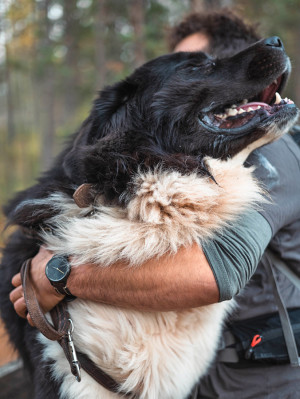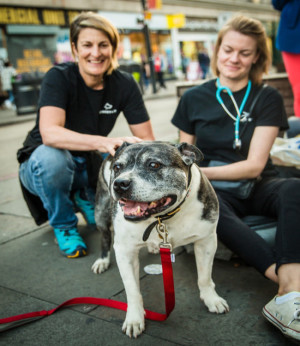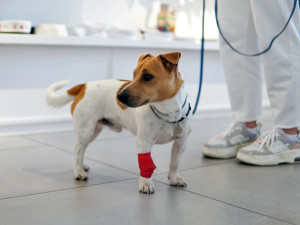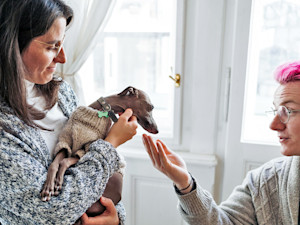Pet Food Banks Can Help If You’re Struggling to Feed Your Pet
Plus, how to donate to pet food banks to help other pet parents in need
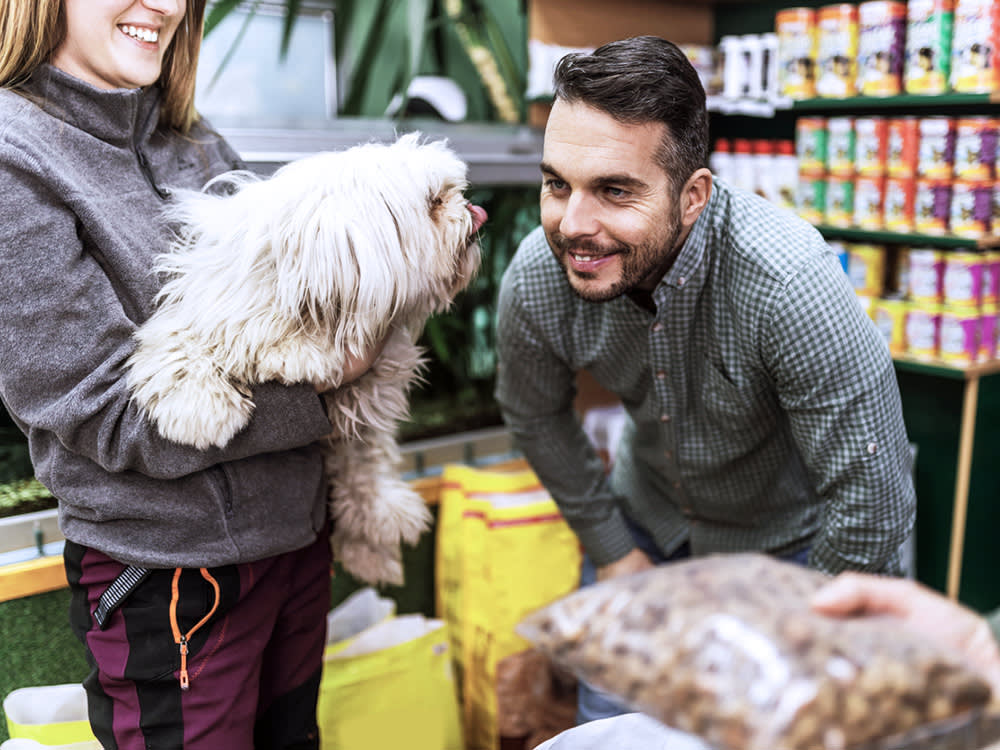
Share Article
If you’re struggling to feed your pet at the moment then trust us on this, you are not alone. According to the Office for National Statistics, in April 2023, a tin of dog food cost 79p. It now costs £1.05 – a 32 percent increaseopens in a new tab. Last year, the average price for dog treats was £1.65. Today, the same treat has risen by 17 percent to an average of £1.93.
Add that to the fact that the cost of everything has gone up and it’s unsurprising that you might be struggling to buy food for your cat or dog right now. In fact, the RSPCA reportopens in a new tab that 30 percent of people are saying they’re worried about being able to care for their pets and 23 percent of pet parents are worried about being able to feed them.

Get (totally free) deals for food, treats, accessories, tech and way more pet parenting must-haves.
For those struggling however, there is help available. Pet food banks are now sadly plentiful as demand has risen across the country. “We have launched pet food banks in a number of our rehoming centres and charity shops in a direct response to the large number of people contacting us to relinquish their dogs,” Dogs Trust tell usopens in a new tab. “We received 50,000 handover requests in 2022 and a further 45,000 in 2023.”
They continue: “For most dog owners, being separated from their dog is no different from being separated from a family member, so we want to keep as many dogs and owners together as possible. With so many people seeing an increase in the cost of dog food, the launch of our food bank is one way we are trying to support dog owners through this difficult time. Thanks to the generosity of people across the UK, we have dog food available for anyone struggling with the cost of feeding their pet.”
Ahead, we look at how you can both access and donate to these vital organisations.
How do pet food banks work?
Because lots of different organisations have stepped up to help in this area, there’s a few different systems out there.
Some well-known animal charities like Dogs Trust and Blue Cross have set up their own food banks in their rehoming centres and charity shops. These food banks are free and don’t require a referral from a housing provider or agency.
Some charities, like the RSPCA Food Bank Project collect pet food donations and deliver them to food banks or special pet food banks (Blue Cross and Dogs Trust also do this as well). You can find a map of the places that they serve hereopens in a new tab. Please do research the individual food bank you choose before heading down to see if they have requirements for who uses the service.
Edinburgh Dog & Cat Homeopens in a new tab operate a similar system in Edinburgh, central and east Scotland. Pet Food Bank Serviceopens in a new tab operate across south Wales. Again, please check out the individual organisation they’re providing the food through prior to heading down.
Other organisations like the Animal FoodBankopens in a new tab will either deliver directly to you or will provide food ready for you to collect at a designated place provided you live in England, Scotland or Wales. Please read their criteria for use and then apply either via phone, email or their Facebook group (this can be done anonymously).
There’s a number of independent pet food banks and food bank projects operating across the country. From East Angliaopens in a new tab to the south of Englandopens in a new tab, Northumberlandopens in a new tab to Northern Irelandopens in a new tab. Some require a referral, some let you just rock up. The most important thing that all of these organisations say is that their services are judgement-free.
Who can use a pet food bank?
All pet food banks are there to help people who are struggling to feed their pets at the moment due to financial reasons. The food banks that have been set up in Blue Cross and Dogs Trust rehoming centres are free to use and do not require a voucher or referral.
Other food banks may require a little leg work beforehand. For instance, to use Animal FoodBank you need to meet their list of requirementsopens in a new tab and then apply via email, phone or their Facebook group (anonymous option available). Other national organisations like Your Local Pantry (some of whom have pet food available thanks to the contributions of other charities) require you pay a couple of pounds membership fee to access their store cupboards. Others, like food banks operated by The Trussell Trust require a voucher or referral from housing associations, GPs or advice charities.
Long story short, it’s best to check in with the organisation you’re approaching first and see what you need (if anything) in order to use their services ahead of time. They’ll be happy to help you figure out what your best options are.
How to find a pet food bank near me
Frustratingly, because there isn’t one umbrella organisation, there’s no big long list so if you’re drawing a blank googling ‘pet food bank’ + ‘your town’ then here’s a few other sources to try.
Blue Cross pet food bank mapopens in a new tab
List of the Dogs Trust food banksopens in a new tab
RSPCA mapopens in a new tab of the food banks it delivers and donates to
The Edinburgh Cat & Dog Home mapopens in a new tab
List of Pet Food Bank Services operate across South Walesopens in a new tab
Contact your local human food banopens in a new tabk to see if they do pet food
How can I donate to a pet food bank?
Dogs Trust accept donations of pet food at their food banks. If you’re not in a position to give food, they also have postersopens in a new tab that you can download, print out and post around the local area in order to help them access more pet parents in need. You can also donate moneyopens in a new tab outright.
Pets at Home have Blue Cross food bank donation stations in every store. You can also take pet food into any participating Blue Cross charity shop, rehoming centre or animal hospital. They also accept monetary donationsopens in a new tab.
Animal FoodBank UK have a few donation points across the countryopens in a new tab they also have an Amazon Wishlist, a Vinted storeopens in a new tab (proceeds from which benefit the food bank), a raffleopens in a new tab and they also accept cash donations via Paypal. They also are constantly in need of volunteersopens in a new tab.
It’s worth reaching out to your local organisation and seeing what they’re in need of, too. Perhaps they’re inundated with dry dog food and are desperately seeking tins, perhaps they’ve just had a pet parent sign up who has a pet with the same special diet that your pet is on. Either way, shooting off an email or calling them on the phone is a great way to make sure that your donation is as helpful as possible.
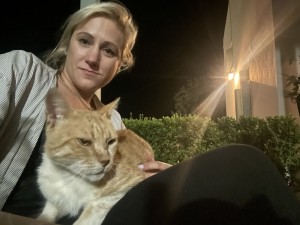
Jess Commons
Jess is a writer, editor and former global lifestyle director at Refinery29 with previous stints at ITV, Grazia, The Debrief (RIP) and more. She is a sucker for an older gentleman cat with A Past and spends most of her time being told what to do by her toddler and her three-legged rescue cat, Mac.
Related articles
![woman hugging dog]() opens in a new tab
opens in a new tabWhere to Get Help If You’re Struggling to Afford Your Pet
If you’re struggling with pet care costs, you are far from alone and there’s no shame seeking help. Here’s a few places to start
- opens in a new tab
What Are The Different Types Of Pet Insurance?
Everything you need to know about how pet insurance works in the UK
![cat in red bow tie being held up by hand]() opens in a new tab
opens in a new tab8 Things You Needn’t Splurge On For Your Pet (If You Don’t Want To)
If you don’t buy these things for your beloved cat or dog, you’re not a bad pet parent
![A woman with glasses holds out a whippet to a boy with pink hair and glasses]() opens in a new tab
opens in a new tabHow To Safely Surrender Your Pet If You Have No Other Choice
It should be a last resort, and there are plenty of options to explore first, but here’s how to surrender your pet safely if you have to
![French bulldog being examined at the vet via stethoscope]() opens in a new tab
opens in a new tab9 Tips For Saving Money At the Vet
Ways to lower your bill – without compromising your pet’s health
